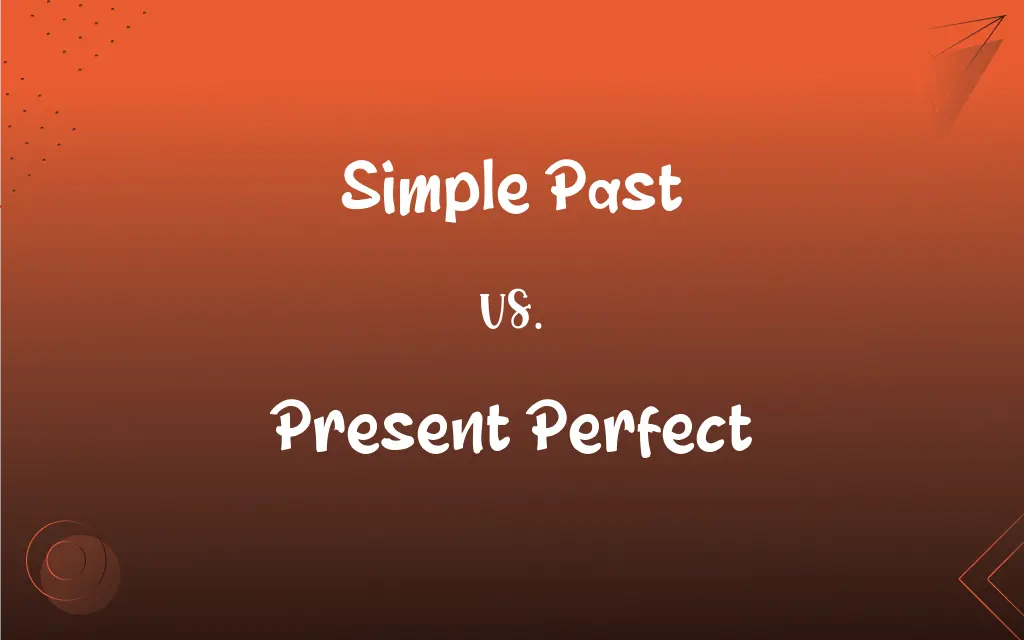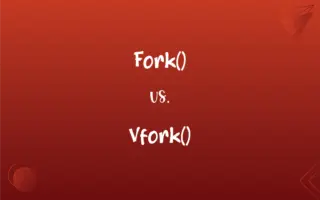Simple Past vs. Present Perfect: What's the Difference?
By Janet White || Published on November 22, 2024
Simple past describes completed actions at a specific time in the past, while present perfect links past actions or states to the present without specifying when they happened.

Key Differences
The simple past tense is used to talk about actions or events that happened at a specific time in the past. It indicates that the action is complete and has no connection to the present. The present perfect tense, however, is used to describe actions or states that occurred at an unspecified time before now. The focus is on the effect of the action or state, not when it happened.
Simple past tense is straightforward; it simply tells us that something was done, saw, thought, or felt at a particular moment in the past. For example, "I ate breakfast at seven o'clock yesterday." This sentence gives a clear indication of when the action took place. The present perfect, on the other hand, might say, "I have eaten breakfast," which implies the action has been completed but does not specify when. The emphasis is on the fact that the action has relevance to the current moment.
The construction of the simple past tense involves using the past form of the verb, which can be regular (ending in -ed) or irregular. In contrast, the present perfect tense is formed using the auxiliary verb "have" plus the past participle of the main verb. This difference in construction reflects their different uses in expressing time relationships.
Use of the simple past often answers the question "When?" because it relates to a specific point in time: last week, yesterday, in 2005. Present perfect, however, often answers the question "Have you ever...?" or "How many times...?" because it is used for actions that happened at an unspecified time or for life experiences.
The simple past is used for actions that are completely finished, the present perfect can suggest that an action in the past is somehow connected to the present. For example, "I have lost my keys" suggests not only that the keys were lost at some point in the past but also that the keys are still missing now. The simple past, by saying "I lost my keys," might merely recount an event without implying its present relevance.
ADVERTISEMENT
Comparison Chart
Time Reference
Specific past time
Unspecified time before now
Action Completion
Completed action
Action with relevance to the present
Form
Past form of the verb
"Have" + past participle
Typical Questions
"When did you...?"
"Have you ever...?" / "How many times...?"
Example
"I visited Paris last year."
"I have visited Paris."
ADVERTISEMENT
Simple Past and Present Perfect Definitions
Simple Past
Describes a sequence of actions in the past.
He entered the room, sat down, and opened his book.
Present Perfect
Used for actions repeated in an unspecified period up to now.
I have seen that movie three times.
Simple Past
Used for conditions or situations that were true in the past.
It rained last night.
Present Perfect
Indicates changes over time.
She has become a better writer.
Simple Past
Narrates historical facts or general truths in the past.
Shakespeare wrote many plays.
Present Perfect
Describes actions or states occurring at an unspecified time before now.
I have finished my homework.
Simple Past
Expresses actions completed at a specific past time.
I played football yesterday.
Present Perfect
Expresses life experiences without specifying when.
They have traveled to Japan.
Simple Past
Indicates past habits or routines.
She walked to school every day.
Present Perfect
Shows the duration of an action that started in the past and continues to the present.
We have lived here for ten years.
FAQs
What is the present perfect tense?
Links past actions or states to the present without specifying when they happened.
What is the simple past tense?
Describes completed actions at a specific time in the past.
When do you use the simple past?
For actions that happened at a specific time in the past.
Why is the time reference important for using simple past?
It specifies when the action occurred, which is crucial for clarity.
What are signal words for the simple past?
"Yesterday," "last year," "in 2005," etc.
How do you form the simple past tense?
By using the past form of the verb, either regular or irregular.
How is the present perfect tense formed?
With "have" or "has" + the past participle of the verb.
Can the simple past tense be used for habits?
Yes, for past habits or routines.
When is the present perfect appropriate?
For actions with relevance to the present or for unspecified times before now.
Can the simple past be used for actions without a specific time?
Typically, no. The simple past usually requires a clear past time reference.
Is the present perfect used to discuss historical events?
Rarely, unless linking them to the present in some way.
Is the present perfect used for life experiences?
Yes, especially without specifying when those experiences happened.
Can the simple past and present perfect be used interchangeably?
No, because they convey different time relationships.
Does present perfect always need a time reference?
No, it often omits specific time references to highlight present relevance.
How does context affect the choice between simple past and present perfect?
It depends on whether the speaker wants to emphasize the action's completion or its relevance to the present.
How do questions differ between simple past and present perfect?
Simple past questions often ask "When?" while present perfect questions may inquire about experiences or actions relevant to now.
Why might someone choose the present perfect over the simple past?
To emphasize the current relevance or ongoing nature of a past action.
Can the present perfect imply ongoing actions?
Yes, especially for actions that started in the past and continue to the present.
Can the present perfect suggest an action might occur again?
Yes, especially when discussing experiences up to the present.
What are common signal words for the present perfect?
"Ever," "never," "already," "yet," etc.
About Author
Written by
Janet WhiteJanet White has been an esteemed writer and blogger for Difference Wiki. Holding a Master's degree in Science and Medical Journalism from the prestigious Boston University, she has consistently demonstrated her expertise and passion for her field. When she's not immersed in her work, Janet relishes her time exercising, delving into a good book, and cherishing moments with friends and family.







































































